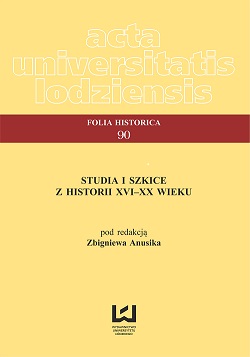The attitude of the Petrograd literary circles to the February Revolution of 1917 was complex
DOI:
https://doi.org/10.18778/0208-6050.90.06Abstract
The spontaneous demonstrations at the end of February 1917 were disapproved by writers. Eye witnesses of those incidents perceived them at first only as a rebellion of lower social strata, but, despite the critical opinion about the behaviour of the crowds, many committed themselves to helping the demonstrators. On the other hand, those writers who at that time were abroad or in other parts of Russia welcomed the events in Petrograd enthusiastically. Some of them made immediate attempts to return to the capital. With time also the writers who were in the capital came to accept the uprising of the Russian people.
Almost all members of the Petrograd literary circles received the abdication of the Tsar enthusiastically. Changes of political and social realities were also observed. During the first weeks after the February Revolution of 1917 worship of Revolution heroes and opponents of the Tsarism developed. It is worth emphasizing that some writers even participated in creation of this cult. On the other hand, writers noticed also the dark sides of the new order, e.g. growing role of ordinary soldiers, manifesting itself in assaults and robberies. They tried also to counteract them, but without greater effects.
A visible trend in the literary circles was a growing interest in politics, yet writers tried to assume rather an attitude of observers of the public life. Only few became involved in activities of government structures or workers’ councils (Soviets). Such behaviour most probably resulted from a negative attitude to the Party and lack of political experience. It will have adverse effects in the future.
Downloads
Downloads
Published
How to Cite
Issue
Section
License

This work is licensed under a Creative Commons Attribution-NonCommercial-NoDerivatives 4.0 International License.











